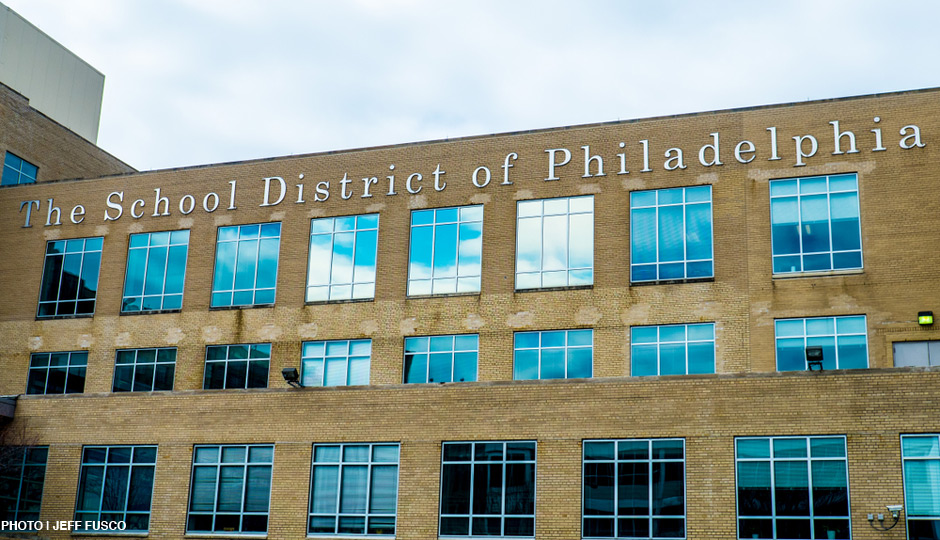Philly Has Boosted School Funding By a Staggering Amount Since 2011
1. Philadelphia has significantly increased funding for the city’s schools since 2011, while money from the state and federal government has dried up.
The gist: It’s that maddening time of year in Philadelphia when school district officials go hat in hand to City Council to ask for more money. Perhaps you’ve wondered why the district requests additional funding every single year — and if there’s any end in sight to their begging. Or maybe you see it from the other side, and would like to know why Council is so irritable about a simple request to fund one of the most important functions of government. Patrick Kerkstra has answers to both questions in a must-read story from the weekend. In short, the city has significantly increased funding for the school district over the last few years, while federal dollars have decreased and state support has barely moved an inch.
Why it matters: These are the most important paragraphs of Kerkstra’s story:
As of this fiscal year, local revenue accounts for 41 percent of the district’s budget, up from 29 percent as recently as 2011. Put another way: Philadelphia is pouring $376 million more into the district right now than it did in 2011. And that’s before the district’s $105 million request for next year is added to the tab.
That’s a staggering increase in the local funding burden over a very short period of time. And it’s a burden the city has been coerced into taking on through a combination of 1) rapid federal disinvestment as the stimulus ended and 2) the Tom Corbett funding cuts, followed by a few years of all-too-modest state funding increases.
Some City Council members have talked about waiting to see what Harrisburg gives the schools this year before approving the city’s budget and possibly asking local taxpayers to dig into their pockets yet again. At first blush, this might make it look like Council is dragging its feet. But according to Kerkstra’s analysis, it is, at the very least, an understandable course of action — and it might even be a reasonable one.
2. Why Tony Williams lost the mayor’s race, in his own words.
The gist: State Sen. Anthony Williams sat down with the Philadelphia Inquirer to talk about his defeat in the mayoral primary election. He said many of the things that pundits have been saying for weeks now: that “Jimmy had a better campaign,” that he should have owned the issue of “school choice,” and that he should have done a better job communicating his message. He also revealed bitter feelings toward Mayor Michael Nutter and state Sen. Vincent Hughes for their actions during the election. After Williams said on the campaign trail that he would fire police commissioner Charles Ramsey, Nutter said, “Anyone who is not smart enough to ask him to stay is probably not smart enough to lead the city.” And Hughes, Williams’ longtime ally in the Senate, came out in support of Williams’ rival, Jim Kenney, shortly before Election Day.
Why it matters: As we said last week, Williams doesn’t seem to be over his loss. There is almost no chance that this will affect Democratic unity in the mayoral election this fall. But will it impact Philadelphia’s negotiations in Harrisburg? Williams has said he’s played a significant role in state funding battles over the last few years; for instance, he’s argued that he was critical in pushing through the legislation that allowed Philly to create a cigarette tax to fund the city’s schools. Many onlookers also believe that Williams is skilled at negotiating with Republicans, who control both the Senate and House. But now Williams is beefing with Nutter, who wants more education funding from the state, as well as Hughes, who he’s worked with in the past to deliver that money.
This isn’t to suggest that Williams would oppose the city’s request. He, of course, wants additional funding for the schools, too. But it could mean that Philadelphia’s lawmakers in Harrisburg — who already aren’t the most cohesive bunch — may be even more fractured in the weeks ahead. And that would be awful timing. State legislators will be hammering out the details of the budget, including the allocation for the city’s schools, in the coming weeks.
3. City Council is one step closer to bringing more sunshine to super PACs and “dark money.”
The gist: KYW reports that a City Council committee has approved a bill that would require any individual, political committee or nonprofit that spends more than $5,000 prior to Election Day to disclose a whole bunch of stuff. “They would face four reporting deadlines within the 50 day pre-election period, and they would have to list all funding received and expenditures made, not just the spending that triggered the filing,” writes KYW. They would need to do this not only if they spent money to support a candidate, but also if they spent money to oppose one.
Why it matters: 2015 will be go down as the first year that deep-pocketed super PACs infiltrated a Philadelphia mayor’s race, making a farce of the city’s strict campaign contribution limits. Both Kenney and Williams had super PACs propping them up, with one in particular out-raising all of the mayoral candidates combined as of early May. It seems that the only thing city lawmakers can do about it is, well, what they’re doing: requiring more disclosure. Welcome to the new world.
